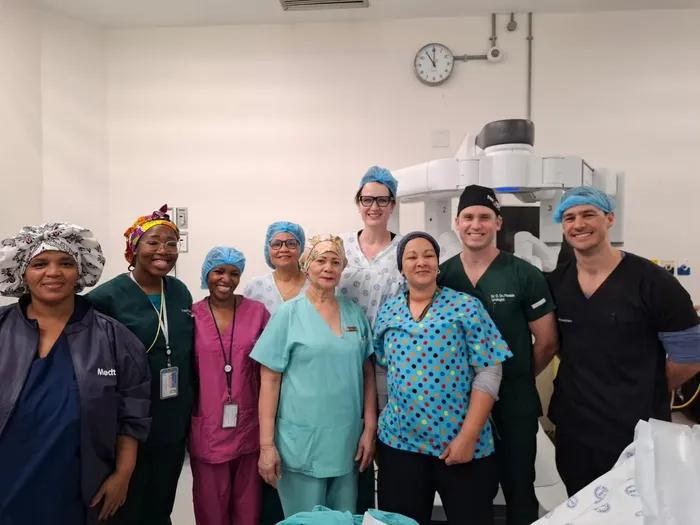
Surgical team that performed SAs first robotic donor nephrectomy.
Image: Supplied
In a pioneering stride for surgical innovation, Tygerberg Hospital, part of the Western Cape Department of Health and Stellenbosch University has achieved South Africa’s first-ever robotic-assisted donor nephrectomy.
This groundbreaking procedure, performed by urologist Dr. Danelo du Plessis using the da Vinci Xi surgical system, underscores the nation’s growing embrace of precision-driven, minimally invasive healthcare.
Performed in under 90 minutes, the procedure involved a 45-year-old mother donating a kidney to her 24-year-old daughter.
Utilising a retroperitoneal approach, made possible by the da Vinci’s immersive 3D console and finely articulated robotic arms, the technique minimised post-operative pain and enabled discharge the very next day. The transplanted kidney began functioning immediately, producing urine upon transplant.
Unlike robotic nephrectomies on diseased kidneys, removing a healthy organ for transplant demands surgical accuracy at the highest level, preserving vascular and ureteral integrity without compromise.
Dr. du Plessis, who has completed over 200 robotic procedures including partial nephrectomies, prostatectomies, and cystectomies, emphasised the ethical imperative: “When operating on perfectly healthy donors … they deserve a safe and minimally invasive procedure. This technology delivers on that promise.”
Hospital CEO Dr. Matodzi Mukosi praised the milestone as a demonstrative leap in patient-centric innovation, while Prof. Elmi Muller from Stellenbosch University highlighted that robotic techniques are now showing outcomes comparable to laparoscopic standards, per a late-2024 consensus.
According to Marcus Medical and the University of the Free State, in March 2025, the Versius surgical robotics system, designed with modularity, portability, and advanced virtual-reality training, was launched at Universitas Academic Hospital in Bloemfontein, the first such system in Southern Africa. Successful procedures across specialities commenced in late February.
As of May 2025, Mediclinic Southern Africa expanded access to da Vinci robotic surgery by introducing three additional systems across various hospitals, enhancing capabilities for urological and colorectal procedures. Surgeons trained on the system reported impressive improvements in recovery times and patient outcomes.
In April 2025, the University of Pretoria inaugurated the country’s first robotic-assisted surgery training centre at the Onderstepoort Veterinary Animal Research Unit. Developed in partnership with Intuitive Surgical, this centre leverages the da Vinci system to deliver simulation-based training across human and veterinary disciplines—marking a novel cross-disciplinary approach to surgical education.
